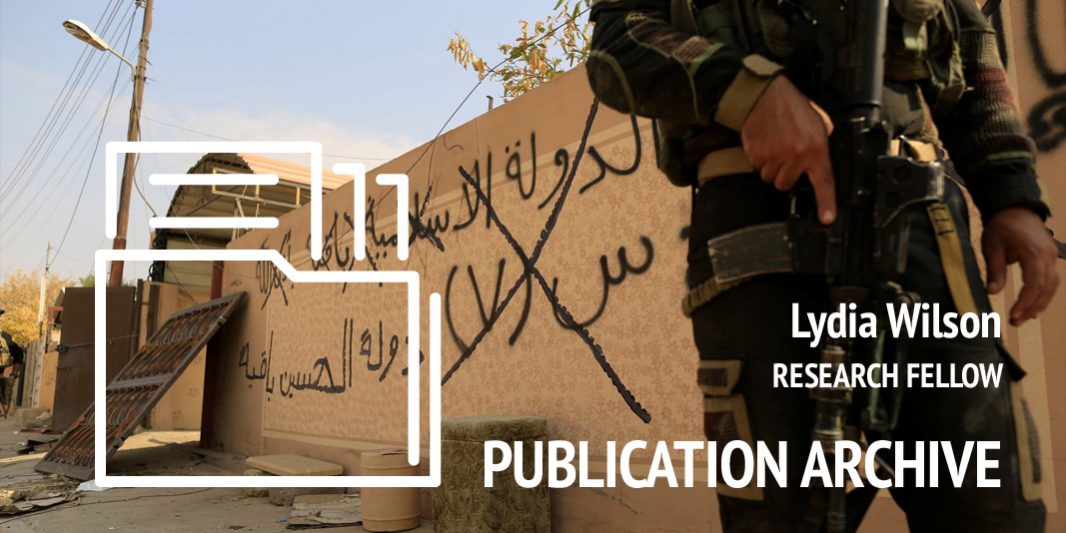Think Iraq Looks Bad Now? You Ain’t Seen Nothing Yet
Author: Lydia Wilson
Published on: www.thedailybeast.com
Already, the treatment of Sunnis in areas liberated from the so-called Islamic State is laying the groundwork for more hatred, violence, and terror to come.
“This is payback for the Speicher massacre,” a Shia soldier said to a Sunni as he stomped all over him and some other helpless Sunni prisoners, his colleagues hitting them with whatever came to hand: metal rods, shovels, pipes, cables. He was referring to a notorious mass execution of Shia military cadets by ISIS in June 2014. In August this year, the Baghdad government executed dozens of people for the atrocities at Speicher. But that was not enough for these Shias seeking their own revenge.
With Iraqi forces inexorably advancing on Mosul, more and more villages are being liberated from the rule of ISIS. Ever more Sunnis are fleeing into other areas of Iraq (if they are not first killed by ISIS snipers or mines). The opportunities for such revenge are growing every day, and they are being taken not just by the Shia militias operating in this war but by the state apparatus, too, fuelling a cycle of violence which can only lead to the next insurgency, whatever form that will take.
A recent report from Amnesty International details this and many other atrocities: cases of torture and extra-judicial executions with hundreds upon hundreds of Sunni men still missing; 643 from one tribe following the liberation of Saqliwa in June, with a further 49 definitely killed. What the report implicitly shows is that Iraq after ISIS promises to be more, not less, unstable, even after this global battle for Mosul and the inevitable military defeat of ISIS.
Unable to escape before Iraqi and Coalition forces attacked, these fleeing Sunnis are treated with suspicion, and not without cause. Some 100 infiltrators launched a bloody attack in Kirkuk a few days ago. But to be detained and questioned in order to assess the threat they pose as undercover ISIS fighters is one thing; to be treated with hatred, tortured and killed in revenge for the barbarity of the Islamic State, held responsible for all ISIS’s sectarian killings and atrocities, is not just horrifying and illegal but bodes ill for the future of Iraq.
History is repeating itself with this mass detention and ill-treatment, and as my own interviews with ISIS fighters in prison show only too clearly, the humiliation of arbitrary detention by American forces or by the Iraqi government has been a major driver to violence and to ISIS—and not just for the victims, but also for their children.
The Sunnis now witnessing the disappearance of their fathers, brothers, cousins and uncles are the insurgent fighters of the future. Unless this endless cycle is somehow broken, the Islamic State in Iraq 3.0 is just around the corner.
And there is a further revenge cycle waiting which has been under-reported until now: the intra-sectarian violence between Sunnis.
There are many who escaped the Islamic State much earlier in the conflict in fear for their lives for various reasons, like working for the Iraqi state as policemen, or for the Americans as interpreters. They often took up arms to fight their previous neighbors, even tribes and families, and so the cycle continues.
One such fighter told Hoshang Waziri, a researcher based in Washington, D.C., and Erbil, of the way his family divided in 2003, and the anger that has built up ever since. He said he couldn’t wait to get back to his village. But when asked if he could forgive his cousins, who had fighting under ISIS, he paused: “ISIS beheads people from their front of the neck, right?” he finally responded. “Well, I will behead my cousins from the back of the neck, where the hard meat is.”
Who will be policing such Sunni-Sunni violence? Given the state’s own actions against the Sunnis, it doesn’t seem there will be an appetite for such protection. To put it bluntly, the government may be pleased someone else is doing this dirty work.
Some of the missing Sunnis will be returned to their families eventually, but they will be even more alienated—if this is possible—from their Iraqi identity. They will have been pushed further into their Arab Sunni identity, ready to turn to the next group claiming to fight for their rights or promising revenge.
The Sunnis in Iraq, rightly or wrongly, once again feel as if they have nothing to lose. What that means is that even an overwhelming victory in Mosul could signal nothing more than a pause in the long—indeed, potentially endless—fight against the Islamic State.


